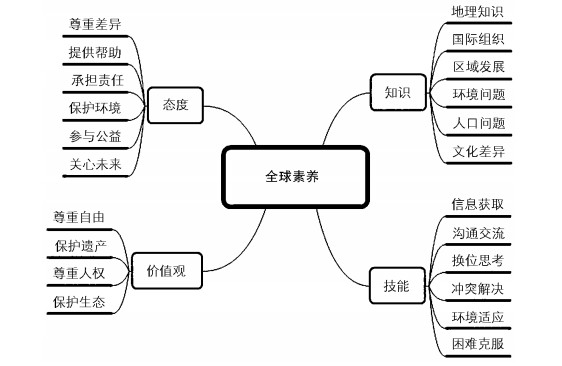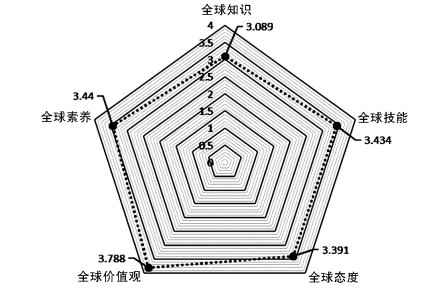-
中国特色社会主义进入新时代,全国教育大会确立了建设教育强国的目标任务,《中国教育现代化2035》提出推进“一带一路”倡议,促进中外民心相通和文明交流互鉴,我国高等教育进入以提升国际竞争力为核心目的的“加快”和“扩大”对外开放的新阶段,培养构建人类命运共同体、共建“一带一路”、推动中国文化、教育、科技等“走出去”所需的高素质国际化人才,是新时代中国高等教育改革发展的重要使命。进而,当今国际社会虽不乏逆全球化现象,但全球化趋势总体上不可逆转、不可阻挡。2020年6月印发的《教育部等八部门关于加快和扩大新时代教育对外开放的意见》着眼加快推进我国教育现代化和培养更具全球竞争力的人才,要求高校加快培养具有全球视野的高层次国际化人才。大学培养的人才能否满足全球化时代的要求,能否创造性地解决全球问题,与全球素养的培养密切相关[1]。全球素养已成为我国大学生核心素养的重要组成部分,是大学生提升就业竞争力、参与全球生活和生存、保护国家安全、参与中国大国外交的必备能力。论文力图明晰全球素养的内涵,分析其结构,基于问卷调查建构大学生全球素养测评模型,经检验后应用于测试大学生全球素养的实际水平,比较不同类别大学生的全球素养差异,为大学生全球素养教育提供参考。
全文HTML
-
“素养”指个体通过长期训练和行为实践而获得的基本技巧或能力。随着时代的发展,素养被拓展至各个领域,出现了媒介素养、劳动素养、数据素养、安全素养等概念[2]。全球素养(Global Competence)是全球化时代的产物,也被称为“国际能力”“国际素养”“全球胜任力”等。美国学者思科特(Schechter)提出,培养学生全球素养的目标是让学生能够适应全球化的就业环境,尊重和欣赏文化差异,具备跨文化交流的技能[3]。美国学者亨特(Hunter)将全球素养定义为:积极了解外国的文化规范和期望,持有开放包容的态度,并能够有效利用获得的知识在本地以外的环境里互动、交流和工作[4]。随着全球化进程的加快,全球素养成为一国公民必备的能力,与家庭、社区、国家范围内所需要的公民能力没有区别[5]。新加坡教育部将全球意识、跨文化技能纳入《21世纪胜任力和学业成就框架》[6]。欧盟于2018年发布的《关于终身学习的核心素养提案》提出欧盟版的新核心素养,加入了跨文化能力、全球公民意识等概念,强调公民的问题解决能力、批判性思维以及创造力[7]。经济合作与发展组织(OECD)将全球素养纳入国际学生评估项目(PISA)测评的核心内容,认为全球素养包含分析当地、全球和跨文化的问题,理解和欣赏他人的观点和世界观,与不同文化背景的人进行开放、得体和有效的互动,为集体福祉和可持续发展采取行动的能力[8]。简言之,全球素养即个体适应全球生活、学习和生存所需的综合能力。
-
对于全球素养的构成,不同学者和组织给出了不同的见解,总体上分为“三维度”和“四维度”模式。如美国学者亨特认为全球素养包含“知识”“技能”“态度与价值观”三要素,其中,“知识”指全球化、世界历史; “技能”指有效参与全球商业、能进行跨文化合作、能识别文化差异、能评价跨文化行为; “态度与价值观”指开放、承认多样性、对差异的认可和非判断性反应。美国学者迪尔多夫(Deardorff)提出全球素养涵盖“知识与理解”“技能”“态度”三维度,其中,“知识与理解”包括文化自我意识、深层文化知识及社会语言意识; “技能”包括倾听、观察、评价、分析、解释和关联; “态度”包括尊重、开放、好奇与发现[9]。美国学者克罗格(Kroeger)也将全球素养划分为“知识”“技能”“态度”三个维度[10],其内涵与上述两位学者的描述基本一致。美国非政府组织“世界智慧”(World Savvy)将全球素养划分为“价值观与态度”“技能”“行为”三个维度[11]。其中,“价值观与态度”包括对新机会和思维方式持开放态度、主动与他人建立友好关系、感知并尊重差异等; “技能”包括理解他人、有效沟通与合作、主动倾听与包容等; “行为”包括坚持终身学习与反思、勇于承担责任、采取合作等。美国州首席教育官员理事会(CCSSO)提出,全球素养包含“探究世界”“分辨不同视角”“沟通思想”和“采取行动”四个维度[12]。其中,“探究世界”指能够探究周边环境之外的世界; “分辨不同视角”指能够分辨自己和他人的视角; “沟通思想”指能与不同背景的人有效交流沟通; “采取行动”指能够将想法转化为适当的行动以解决全球问题。OECD于2017年12月与哈佛大学合作发布了《PISA全球素养框架》,将全球素养划分为“知识”“技能”“态度”和“价值观”四个维度[13]。其中“知识”指全球议题和跨文化知识; “技能”指分析与批判思维、以适当的方式与他人打交道、具备同理心和适应能力; “态度”指对不同文化的人持宽容态度、尊重文化他者、具备全球思维、勇于承担责任; “价值观”指维护人类尊严、尊重文化差异。
上述框架存在细微差别,特别是美国州首席教育官员理事会提出的四维度,但抛开提法挖掘内容发现,其内涵要义与知识、技能、态度和价值观并无不同。均关注全球议题和多元文化知识、发现和解决问题能力、跨文化交流能力,以及多元文化意识、多视角思维、开放和包容的态度与价值观。因此,论文也将全球素养划分为知识、技能、态度和价值观四要素。其中,“知识”涉及世界各国的历史地理、国际组织等事实性知识,以及人口、环境等全球问题涉及的知识,还包括跨文化间的相似性、差异性和相互影响关系。“技能”重在解决跨文化交流合作时面临的问题,特别是文化差异带来的问题,具体涵盖信息获取能力、跨文化沟通交流能力、换位思考能力、解决冲突能力等。“态度”要求人们开放和包容,尊重文化差异、尊重多样性,勇于承担全球责任,如保护环境、参与公益等。“价值观”包括尊重自由与人权,学会从不同角度看世界并审视自己的思想和信仰,具备保护世界遗产和保护生态环境的意识,为子孙后代的可持续发展打下基础。可见,“知识”与“技能”是“态度”与“价值观”形成和发展的基础,受“态度”和“价值观”的监控、指导和激励,“态度”和“价值观”也会促进全球知识的积累和跨文化技能的形成。
一. 全球素养的内涵
二. 全球素养的结构
-
本研究编制了《大学生全球素养测评问卷》。问卷第一部分为大学生的基本信息,包含性别、年级、户籍、专业等信息,以厘清问卷对象的来源。问卷第二部分根据知识、技能、态度和价值观四维度内涵,初步整理出包含35个问题的测评量表。邀请领域专家对量表进行评估,根据专家意见进行二次整理,得到30个题项。知识、技能、态度、价值观四维度包含题项数量分别为6、10、9、5。采用李克特5点量表计分,其中,1代表“完全不符合”,2代表“比较不符合”,3代表“一般符合”,4代表“比较符合”,5代表“完全符合”。采用问卷星编制问卷,通过网络平台对学生进行问卷测试,共回收问卷2 453份。将答题时间少于100秒和有缺失数据的119份问卷作为无效问卷删除。最终调查对象为52所本科院校的2 334名学生,其中男生1 141名,女生1 193名,外语专业学生1 127名,非外语专业学生1 207名。利用余下调查数据对问卷的质量进行检验,具体包括检验问卷的题项是否具有区分度、效度与信度。
-
问卷题项的区分度检验也称项目分析,是检验量表中单个题项的适切或可靠程度。可采用独立样本T检验法和相关分析法,前者是检验高低分受试者在每个题项上的差异,而后者是检验题项间的同质性,本研究选择独立样本T检验法。首先,查看题项是否存在反向计分,再求出量表总分。将所有受试者在预试量表的得分总和依高低顺序排列,得分位于前27%者确定为高分组(本问卷中为114分),得分位于后27%者确定为低分值(本问卷中为92分)。其次,针对每一题项高低分组的差异进行独立样本T检验,若题项在高低分组中存在显著差异,则表明该题项具有区分度,否则删除该题项。本问卷中,“我能很快从互联网上获取我想要的信息”(P=0.107)和“我能够识别和筛选网络中有价值的信息”(P=0.09)两个题项区分度检验结果不显著,需要删除。其余28个题项均具有区分度。
-
效度是量表所能正确、有效地测量理论特质的程度,主要包含内容效度和结构效度。内容效度是指题项对所要测量内容范围的代表程度,论文中量表的题项是根据全球素养四维度及其内涵编制,因而内容效度良好。结构效度指量表能够反映理论特质或概念的程度,也即测验与理论之间的一致性程度。论文采用因子分析法的主成分分析法检验结构效度,选择特征值大于1的主成分,运用最大四次方值进行因子旋转。第一次主成分分析结果显示,KMO值为0.905,大于0.6,显著性水平为0.000 < 0.01,表明原始数据适合做因子分析。每个题项共同度均大于0.3,其中“我对各国的政治、经济、文化很感兴趣”和“我关心子孙后代的生存环境”两个题项在两个因子上的载荷值均超过0.5,为多极题项,应删除。第二次因子分析改用主轴法,提取特征值大于1的四个因子,分别定义为全球知识、全球技能、全球意识和全球价值观。因子载荷及分布较好,其累计贡献率为69.194%。
-
信度表示量表的可靠性或稳定性,在态度量表中采用克朗巴哈信度与折半信度两种信度检验,考察测验的各题项是否测量了相同的内容或特质。若信度系数高于0.8,则说明问卷信度高; 若介于0.7至0.8之间,则说明信度较好; 若介于0.6至0.7之间,则说明信度可接受; 若小于0.6,说明信度不佳。通过量表各维度及总量表的信度检验,如表 1所示,无论是克朗巴哈信度系数还是折半信度系数,知识、技能、态度和价值观各维度及问卷整体的信度系数均高于0.7,说明问卷具有较好的信度。
一. 区分度检验
二. 效度检验
三. 信度检验
-
构建全球素养测评模型,旨在评估大学生的全球素养水平,模型的质量决定了评估结果的有效性与准确性。因此,全球素养测评模型在确定各维度对应的测量指标及其因子负荷量后,还需评估其内在质量和外在质量,对模型加以验证。只有当模型质量检验通过,才能用模型结果量化全球素养及其维度。
-
模型构建的第一步是确定全球素养的四个维度分别包含哪些题项,需要根据各维度对应的初始题项在Amos中建立模型,计算标准化回归系数。标准化回归系数是由变量转化为标准分数(Z分数)后计算出来的。与非标准化系数相比,标准化系数更能反映测量变量在潜在因素中的相对重要性。标准化系数在验证性因素分析中也称为因素加权值或因子负荷量。在标准化估计模型中,模型内每个估计参数需达到显著水平(P<0.05),因子负荷量应达0.5,才能保证模型匹配达到理想水平。
在初始模型建构中,知识维度包含全球地理知识、国际组织、区域发展、环境问题、人口问题和文化差异6个观测变量,对应的因子负荷量都大于0.5,因而全部保留。技能维度需要删除因子负荷量小于0.4的两个题项,即“我能用外语熟练地与外国人交流”和“在与外国人交流时,我表达清楚且自信”。其余6个题项收敛效度较好,可进入模型。6个题项命名为信息获取、沟通交流、换位思考、冲突解决、环境适应、困难克服,对应的因子载荷量均大于0.5。态度维度需要删除“与不同文化的人员进行交流时,我不认为自己的价值观、信仰和行为是唯一正确的”。剩余6个题项包含尊重差异、提供帮助、承担责任、保护环境、参与公益、关心未来,因子负荷量均大于0.5,收敛效度较好。价值观维度需要删除因子负荷量小于0.4的题项“看到学校内有霸凌的行为,我会勇敢地上前制止”。剩余4个题项包含尊重自由、保护遗产、尊重人权、保护生态,对应的因子负荷量均大于0.5,收敛效度较好。
全球素养测评模型建构初步完成,全球素养包含的知识、技能、态度和价值观四个潜在变量,分别用KN、TE、CO和VE表示,对应的因子负荷量分别为0.56、0.82、091和0.89(四舍五入小数点后两位)。潜在变量“知识”涵盖地理知识、国际组织、区域发展、环境问题、人口问题和文化差异6个观测变量,分别用KN1、KN2、KN3、KN4、KN5和KN6表示,对应的因子负荷量分别为0.71、0.79、0.80、0.58、0.76和0.64。潜在变量“技能”涵盖信息获取、沟通交流、换位思考、冲突解决、环境适应和困难克服,分别用TE1、TE2、TE3、TE4、TE5和TE6表示,对应的因子负荷量分别为0.82、0.70、0.88、0.88、0.76和0.87。潜在变量“态度”涵盖尊重差异、提供帮助、承担责任、保护环境、参与公益和关心未来6个观测变量,分别用CO1、CO2、CO3、CO4、CO5和CO6表示,对应的因子负荷量分别为0.80、0.83、0.84、0.88、0.77和0.86。潜在变量“价值观”涵盖尊重自由、保护遗产、尊重人权和保护生态,分别用VE1、VE2、VE3和VE4表示,对应的因子负荷量分别为0.76、0.81、0.92和0.84。22个测量指标及4个潜在变量的因子负荷量均大于0.6,模型内每个估计参数均达到显著水平(P=0.000<0.05),模型匹配理想。
-
模型构建完成后,为进一步检验模型的质量,需要根据因子负荷量计算组合信度(CR)与平均方差抽取量(AVE),检验模型内在质量[14]。对Amos输出数据加以整理,根据因子负荷量,求得各测量指标对应的信度系数和测量误差。信度系数为因子负荷量的平方,测量误差为“1-信度系数”,表示潜在变量无法解释测量指标的程度。根据因子负荷量,可以计算潜在变量的组合信度,作为检验潜在变量的信度指标。组合信度公式为:
其中,λ为标准化因子负荷量,θ为测量误差。
平均方差抽取量与组合信度类似,表示指标变量被潜在变量解释的变异量大小,平均方差抽取量越大,相对测量误差越小。平均方差抽取量计算公式为:
若组合信度大于0.6,平均方差抽取量大于0.5,模型内在质量较好。计算结果如表 2所示,知识、技能、态度和价值观四个维度的组合信度CR值分别为0.86、0.93、0.93和0.90,远大于0.6。平均方差提取量AVE值分别为0.52、0.67、0.69和0.70,均大于0.5。全球素养整体的组合信度CR为0.88,AVE为0.65,整体模型内在质量良好。
模型验证还需检验整体模型适配度指标,评估模型外在质量。整体模型适配度指标用于评价假设的模型与收集的数据是否相互适配。学者海耶(Hair)于1998年提出,模型整体适配度分为绝对适配度测量、增值适配度测量和简约适配度测量三类[15]。绝对适配度指标包含x2、GFI、AGFI、SRMR、RMSEA等; 增值适配度指标包含NFI、RFI、IFI、CFI等; 简约适配度指标包含PGFI、PNFI、CN等。通常情况下,只需满足SRMR<0.05,RMSEA<0.08,CFI>0.9,就可认为模型外在质量良好。对全球素养模型进行适配度检验,SRMR为0.023 5,小于0.05;RMSEA为0.054,小于0.08;CFI为0.953,大于0.9。因此,模型适配检验通过,也即模型外在质量良好。
-
全球素养测评模型包含了5个潜变量,即全球素养、知识、技能、态度和价值观,要获得大学生的全球素养水平,需计算5个潜变量的值。潜变量值的计算方法为各观测变量乘以其权重,再求和。根据测评模型的输出结果,查询因子得分权重(Factor Score Weights,简称FSW),对全球素养模型各因子的得分权重作归一化处理,即可得到各观测变量相对因子的权重值。如在“知识”维度中,6个观测变量对应的因子得分权重分别为0.101、0.161、0.080、0.209、0.184和0.122,再归一化处理求权重。KN1的权重为:0.122/(0.101+0.161+0.080+0.209+0.184+0.122)*100%=14.24%,用同样的方法可计算其他观测变量的权重(如表 3所示)。
依据权重与各指标值计算四个潜变量的得分值:
全球素养得分值计算方法为知识、技能、态度和价值观对应的得分值与其对应权重的乘积。在AMOS测评模型输出结果中查询因子得分权重,KN、TE、CO和VA对应的数值分别为0.091、0.103、0.178和0.125,对数值归一化处理后得到权重值分别为18.31%、20.72%、35.81%和25.15%。因此,全球素养=
$K N * 18.31 \%+T E * 20.72 \%+C O * 35.81 \%+V A * 25.15 \% $ 。
一. 测评模型的构建
二. 测评模型的验证
三. 各潜变量值的计算
-
为了解大学生的全球素养水平,论文根据测评模型获得的全球素养及各维度的计算公式,评估大学生全球素养的整体发展水平及其在知识、技能、态度和价值观四维度中的表现,统计分析不同性别、专业、户籍和年级的大学生在全球素养及各维度上的表现是否存在差异。
-
大学生的全球素养与各维度得分值可以反映大学生全球素养的实际状况。全球素养均分为3.44,标准差为0.56,最小值1.62,最大值4.82。从各维度上看,四维度得分均值集中在3-4分之间。价值观得分较高,表明大学生对全球素养的宏观认识比较准确,但知识维度得分较低,表明大学生对全球素养的基础知识掌握欠佳。
全球知识的均分为3.089,6个题项的选择基本集中在2、3、4上,如在“国际组织”题项中,有7.2%的选项为“完全不符合”,20.1%的选项为“比较不符合”,27.8%的选项为“一般”,35.4%的选项为“比较符合”,9.6%的选项为“非常符合”。全球技能的均分为3.434,题项选择也集中在2、3、4上,如在“沟通交流”题项中,从“完全不符合”到“非常符合”的百分比分别为6.9%、26.3%、34.4%、22.5%和9.9%。全球意识的均分为3.391,6个题项中选择“完全不符合”的比例集中在2%至3%之间,在“尊重差异”题项中有1.8%的选项为“完全不符合”。全球价值观的均分为3.788,在“尊重人权”题项上有40.4%的选项为“非常符合”,各题项选择“完全不符合”的比例约为4%。综合上述,各题项均有选择“完全不符合”“比较不符合”选项,而在知识维度中占比较大。可见,全球素养四维度均有提升的必要,而知识维度尤其应引起重视。
-
1.性别差异。参与问卷调查的男生有1 141名,女生有1 193名。采用独立样本T检验对男女生的全球素养及其四个维度进行差异比较,显示男生和女生在知识和技能两个维度上存在显著差异,显著性值均为0.000。在知识维度,男生的均分为3.43,而女生仅为2.84,男生在知识维度上的表现显著高于女生。在技能维度,男生均分为3.65,女生为3.27,显示男生的技能水平显著高于女生。而在态度和价值观两个维度上,男女生没有显著差异。男女生的全球素养整体上存在显著差异(T=3.426,P=0.001<0.01),男女生的平均得分分别为3.56和3.36,显示男生的全球素养发展水平高于女生。
2.户籍差异。户籍所在地为城市和农村的学生简称为“城市学生”和“农村学生”。参与调查的城市学生有1 132人,农村学生1 217人。城市学生与农村学生在知识、技能、态度和价值观四个维度上均存在显著差异,显著性水平分别为0.021、0.000、0.003和0.005,均小于0.05。城市学生在四个维度上的水平均显著高于农村学生。在知识维度,城市学生的均值为3.24,农村学生为3.00。在技能维度,城市学生的均值为3.61,农村学生为3.25。在态度维度,城市学生的均值为3.49,农村学生为3.26。在价值观维度,城市学生的均值为3.91,农村学生为3.66。城市学生与农村学生的全球素养整体水平也存在显著差异(T=3.824,P=0.000<0.01),得分均值分别为3.58和3.31,显示城市学生的全球素养水平显著高于农村学生。
3.专业差异。参与问卷调查的外语专业学生为1 127名,非外语专业学生数为1 207名。独立样本T检验结果显示,外语专业与非外语专业学生在知识和技能水平上存在显著差异,显著性值均为0.000。在知识维度,外语专业学生的均值为3.47,非外语专业学生仅为2.86,显示外语专业学生的知识水平显著高于非外语专业。在技能维度,外语专业学生的均值为3.61,非外语专业学生为3.32,显示外语专业学生的技能水平显著高于非外语专业。而在态度和价值观两维度上外语专业和非外语专业学生没有显著差异,显著性水平分别为0.890和0.564。外语专业与非外语专业学生的全球素养整体水平存在显著差异(T=2.946,P=0.003<0.01),得分均值分别为3.56和3.38,显示外语专业学生的全球素养水平显著高于非外语专业学生。
4.年级差异。经单因素方差分析发现,不同年级学生在知识和技能水平上存在显著差异,显著性水平分别为0.000和0.026,均小于0.05,而在态度、价值观和全球素养整体上不存在显著差异。经事后比较,在知识维度上,大一学生显著低于大二和大三学生,大二和大三学生显著高于大四学生,但大二、大三学生间不存在显著差异。在技能维度上,大一学生显著低于大二学生,大二学生显著高于大四学生,其余组不存在显著差异。综合来看,大二学生在知识与技能方面提升较好,而大三、大四进展不佳,甚至出现退步。一种可能的解释是,大四学生随着阅历的增加对自身全球素养反而不自信,致使得分降低。
一. 大学生全球素养发展水平
二. 大学生全球素养水平的差异分析
-
全方位提升大学生全球素养,培养新时代所需的高素质国际化人才,需要构建大学生全球素养测评模型,了解大学生全球素养的真实水平,为大学生全球素养培养的目标定位、内容选择和实施路径提供参考。论文历经“全球素养内涵结构分析-问卷编制与检验-测评模型构建与验证-大学生全球素养测评”的基本过程,从全球素养及知识、技能、态度和价值观四维度的基本内涵入手,结合新时代全球化发展对大学生的基本要求,构建了信效度较高、适配度良好的全球素养测评模型,为大学生全球素养提供了较科学的测评工具。应用测评模型评估大学生全球素养水平,并比较不同性别、专业、户籍地和年级学生的全球素养差异,有以下基本发现:一是在测评模型中,态度和价值观的权重分别为35.81%和25.15%,知识和技能的权重为18.31%和20.72%,显示态度和价值观对全球素养的整体贡献度更大。二是大学生全球素养水平整体尚可,均值为3.44,知识、技能、态度和价值观的均值分别为3.089、3.434、3.391和3.788,显示无论是全球素养整体还是四个维度,仍有提升空间。三是不同类别学生全球素养存在显著差异:男生在知识与技能上的得分显著高于女生,在全球素养整体表现上也显著高于女生; 城市学生在四个维度上均显著高于农村学生,在整体表现上也显著高于农村学生; 外语专业学生在知识、技能和全球素养整体表现上显著高于非外语专业学生; 不同年级学生在知识和技能维度上存在显著差异。针对以上发现,提出以下建议。
一是正确处理全球素养四维度间的关系。全球素养四维度相辅相成,相互促进。知识和技能是基础和前提,态度和价值观可称作全球素养的“灵魂”[16],直接影响着知识与技能的学习,进而影响全球素养的整体发展。然而,长期以来,我们更多关注知识与技能的发展,如某个知识点是否记住,某项技能是否掌握,常常忽视态度和价值观的培养。因此,教师在教学中应加强引导,以合作、对话为原则,综合考虑学习者需求和时代需要,借用案例教学、任务教学等教学方法,在夯实知识和技能的同时也重视态度和价值观的培养,促进大学生全球素养的全面发展与和谐发展。
二是采取多种措施提升大学生全球素养水平。从测评结果来看,大学生全球素养水平仍有待提升。测评模型的二级指标为大学生全球素养的培养提供了内容参考。高校应有针对性地加强学生全球素养的培养,在培养目标、课程建设、师资队伍等人才培养体系上下功夫。第一,增强全球素养的培养意识,将全球素养融入人才培养目标之中。高校在设计全球素养培养目标时,应综合考虑全球素养的整体目标和具体目标。测评模型可为全球素养的培养提供目标框架参考,但此框架仍是纲领性的,需要制定总目标和分目标,进一步细化为单元目标和教学目标,以确保全球素养的培养落到实处。第二,挖掘全球素养的课程载体。全球素养的培养既可通过设置独立的课程群,也可以整合到学科课程之中,还可以通过综合实践活动实现[17]。非外语专业教学大多没有独立的全球素养课程群,需要挖掘可以承载全球素养培养的学科课程,如语言类、数学类、科学类及社会类课程,均可以作为全球素养培养的载体。第三,提升学校师资的国际化水平。只有教师具备良好的全球素养才能更好地培养和发展学生的全球素养,但现阶段大学教师的全球素养水平参差不齐,有海外留学经历的国内教师和外籍教师比例不高。学校应采用多种优惠政策鼓励教师出国研修或攻读学位,通过中外合作教学、科研、交流项目等提升教师的国际意识和能力。第四,成立“全球素养发展指导中心”。不断探索发展学生的世界知识、语言、开放与沟通等素养,培养学生在多元文化环境中高效学习、工作和与人相处的能力。
三是尽力弥补性别、年龄、户籍和年级差异带来的全球素养差距。第一,学生应积极争取和利用好出国交流、学习的机会,主动与国际学生、外籍人士、有留学经历的同学进行沟通交流。第二,综合利用校内外资源。利用学校的实体资源、数字资源,使学生深入了解与探究“绿色环保与可持续发展问题”“人权问题”“人口问题”“文化差异问题”等全球议题[18]。通过校园网络平台,实现各专业和各年级学生共享学习资源。另外,综合利用使领馆、跨国公司、国际组织、国际展会、国际人文交流平台等校外资源,以校外实习、综合实践活动等形式提升学生的全球素养。[19]第三,实现合作学习。借助网络学习平台或选修课,让不同性别、不同专业、不同户籍和不同年级的学生进行合作,积极开展国际辩论、角色扮演等学习交流活动,让学生在合作交流中发现自身不足,进而弥补差距。




 下载:
下载:
